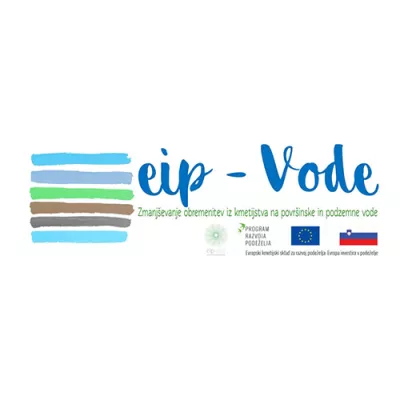General information
RDP Priority
- P2. Competitiveness
RDP Focus Area
- 2A: Farm’s performance, restructuring & modernisation
RDP Measure
- M16: Cooperation
Beneficiary type
- Operational group
Summary
The EIP Water Project aimed to develop and demonstrate new agricultural production approaches in Slovenia that could measure and reduce the leaching of harmful substances, especially nitrates, into underground and surface waters. The project goal was to provide training so that more Slovenian agricultural holdings could introduce modern, eco-friendly methods of farming.
Results
- A prototype of a small lysimeter was developed to measure the leaching of nitrates from agricultural land into groundwater. The lysimeter enables the sampling and analysis of water that actually flows from agricultural land into the aquifer.
- An innovative technology was developed for making compost pellets from solid and liquid animal slurry on small farms.

Promoter
Geological Institute of Slovenia*
* The project promoter/beneficiary is an EIP-AGRI Operational Group
Funding
Total budget: 250 000 (EUR)
EAFRD: 200 000 (EUR)
National/Regional: 50 000 (EUR)
Ressourcen
Documents
Context
Preparations for Slovenia’s 2016-2021 'Water Management Plan' confirmed that three of the country’s underground water bodies were in a poor state due to high concentrations of nitrates and the pesticide atrazine leaching from intensive livestock production and the overuse of fertiliser on plant crops.
The EIP Water project focused on how to process excess manure and slurry from livestock production to reduce their environmental impact. However, as the available practices and technologies had yet to be tested and demonstrated in Slovenia, practical demonstrations were needed to help encourage the uptake of mitigation opportunities.
Objectives
The main aims of this project were to share good practices and develop fertiliser regimes that reduce the leaching of nutrients into water.
Activities
This project identified suitable technologies and agricultural practices for reducing nitrogen emissions. These were introduced on demonstration farms.
Throughout the project, regular monitoring of nitrogen emissions was carried out with the help of small lysimeters installed directly under agricultural land. The data gathered by the lysimeters in the test fields enabled the project team to quantify the nutrient load in water samples taken from different areas of agricultural activity – each under different agricultural cultures and fertilisation regimes - at different times throughout the year.
The second segment of the project explored good practices in using water-friendly organic fertilisers in agricultural, horticultural, viticultural and hop production. Having confirmed that the solid phase of slurry produced by pigs is a suitable raw material for making pellets for organic fertilisation of agricultural land, the project team set out to test suitable additives for producing pellets. These products are known to have a lower impact on underground and surface water, and livestock manure processing itself also has the potential to become an additional source of revenue for larger livestock farms.
During the project's demonstration phase, the team was able to compare nitrogen leaching from irrigated agricultural areas with nitrogen from non-irrigated agricultural areas. The team also found that composting the solid phase of livestock manure with the liquid phase of the slurry is possible. This enables a reduction in the use of liquid animal manure on agricultural land, which is known to have a much greater potential for leaching nitrates into the water than is the case with solid organic fertilisers.
Extensive educational and promotional activities were carried out with a specific focus on developing skills and sharing knowledge with the owners and managers of agricultural holdings.
Led by the Geological Survey of Slovenia, the other partners of this EIP Operational Group were the demonstration farms (farm Ihan, the Slemenjak Skoke livestock farm, the Rančigaj Gomilsko hop farm, the Vrabec Pliskovica vineyard and the Zatler Kleče vegetable farm); the Agricultural Institute of Slovenia; the Slovenian Institute of Hop Research and Brewing; the Biotechnical Faculty of the University of Ljubljana; the ‘Grm Novo mesto’ University Centre; and the Maribor Institute of Agriculture and Forestry.
Main results
- The project determined the impact of agricultural irrigation on the leaching of nitrates into groundwater. An important finding was that farms could reduce nutrient leakage with professional and correct irrigation.
- The project developed:
- the prototype of a small lysimeter for measuring nitrate leaching from agricultural land into groundwater;
- technology for making pellets from animal slurry (solid phase), including the appropriate hardware (pellet press), additives for creating the appropriate consistency of pellets and a full scoping of the economics of pellet production;
- technology for making compost from the solid phase of animal manure in combination with the liquid phase;
- a prototype floating cover for slurry lagoons that has several functions including reducing the smell of the slurry, preventing its dilution with storm water, preventing the leakage of greenhouse gases into the atmosphere and sequestration of the biogas produced in the lagoon.
- As part of its 'Water Friendly Agriculture' dissemination campaign, the project organised 11 environmental workshops for farmers, released two television reports via public media (RTV SLO and NET TV); produced four promotional videos for distribution via You Tube; published nine articles in professional agricultural journals and created a series of thematic online manuals, which can be downloaded from the project's website.
Key lessons
- During the implementation of the project, it became evident that agricultural holdings in Slovenia were very interested in new practices and technological approaches that could reduce the impact on the environment and increase the added value of farm products. There was particular interest in the separation of livestock slurry and the production of pellets.
- The project team noticed few opportunities in Slovenia for farmers to see new technology in practice. For this reason, within the context of the project activities carried out at the Agricultural Institute in Jabla, the team established a demonstration centre for new technologies concerning the processing of livestock manure. Here, farmers can learn about several different technologies in one place regarding slurry separation, anaerobic digestion, pellet production and composting.
Let's reduce nitrogen emissions into waters by additional processing of livestock manure!
